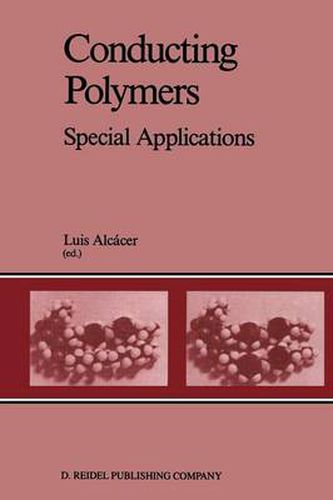Readings Newsletter
Become a Readings Member to make your shopping experience even easier.
Sign in or sign up for free!
You’re not far away from qualifying for FREE standard shipping within Australia
You’ve qualified for FREE standard shipping within Australia
The cart is loading…






This title is printed to order. This book may have been self-published. If so, we cannot guarantee the quality of the content. In the main most books will have gone through the editing process however some may not. We therefore suggest that you be aware of this before ordering this book. If in doubt check either the author or publisher’s details as we are unable to accept any returns unless they are faulty. Please contact us if you have any questions.
The development and the study of both ionic and electronically conducting polymers have been. in the past few years. areas of* increasing interest. These new materials are. in fact. being considered for many technological applications. namely low weight. high energy density batteries and sensors. This volume contains the proceedings of a workshop on this subject. sponsored by the U.S. Army Research. Development and Standardization Group (U.K.). which took place in Sintra - Portugal from July 27 to July 31. 1986. The workshop. which included lectures. communications and discussion panels. was very sucessfull and the combination of ionic with electronically conducting polymers and their applications. not usually together in workshops or conferences. proved to be an excellent idea. Lisbon December. 1986 Luis Alcacer ix THE ELECTROCHEMISTRY OF ELECTRONICALLY CONDUCTING POLYMERS J. O’M. Bockris and David Miller Department of Chemistry Texas A&M University College Station, Texas 77843 USA ABSTRACT. The new field of the electrochemistry of electronically conducting polymers is reviewed. A brief historical account traces the beginning of organic electrodes to Ka11mann and Pope, who, in 1960, observed charge injection and conductance in anthracene electrodes.
$9.00 standard shipping within Australia
FREE standard shipping within Australia for orders over $100.00
Express & International shipping calculated at checkout
This title is printed to order. This book may have been self-published. If so, we cannot guarantee the quality of the content. In the main most books will have gone through the editing process however some may not. We therefore suggest that you be aware of this before ordering this book. If in doubt check either the author or publisher’s details as we are unable to accept any returns unless they are faulty. Please contact us if you have any questions.
The development and the study of both ionic and electronically conducting polymers have been. in the past few years. areas of* increasing interest. These new materials are. in fact. being considered for many technological applications. namely low weight. high energy density batteries and sensors. This volume contains the proceedings of a workshop on this subject. sponsored by the U.S. Army Research. Development and Standardization Group (U.K.). which took place in Sintra - Portugal from July 27 to July 31. 1986. The workshop. which included lectures. communications and discussion panels. was very sucessfull and the combination of ionic with electronically conducting polymers and their applications. not usually together in workshops or conferences. proved to be an excellent idea. Lisbon December. 1986 Luis Alcacer ix THE ELECTROCHEMISTRY OF ELECTRONICALLY CONDUCTING POLYMERS J. O’M. Bockris and David Miller Department of Chemistry Texas A&M University College Station, Texas 77843 USA ABSTRACT. The new field of the electrochemistry of electronically conducting polymers is reviewed. A brief historical account traces the beginning of organic electrodes to Ka11mann and Pope, who, in 1960, observed charge injection and conductance in anthracene electrodes.